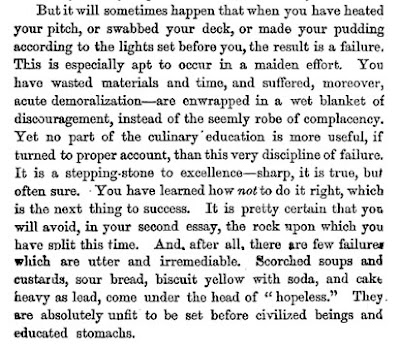Before cooks on TV told housewives that it was possible for them to be culinary heroes capable of making dishes chefs would be proud to serve each and every day, cookbook writers reassuringly put women in their place — and that was just below the level of rank amateur.
Instead of the cheerleader home cook who manages to look groomed and sexy while not making a mess in their spotless, fashionable kitchen, yesterday’s experts were more like hard-nosed coaches screaming at you to get your sorry ass up and try again.
In 1874, when Marion Harland wrote about common sense in the household, failure wasn’t as much of an option as it is now, when a ruined dinner can be fixed with a pizza delivery. Failure was something to be worked with and overcome. The main thing was to mask the disaster from your husband, so that he shall “remain in blissful ignorance that aught has gone wrong.”
This was a time when people used the word “aught” instead of “anything.” Aught is a far superior word of the kind used by women not afraid to tell novice housekeepers that their fumbling efforts cause them to be “enwrapped in a wet blanket of discouragement, instead of the seemly robe of complacency.”
The "robe of complacency" is not to be confused with the robe of terrycloth.
The kind of women who use the word “enwrapped” are never failures.
Common Sense in the Household: A Manual of Practical Housewifery, Marion Harland, 1874
Also by Marion Harland: The Alternate Tale of Squirrel Nutkin, Stained, Roast Bambi
Also by Marion Harland: The Alternate Tale of Squirrel Nutkin, Stained, Roast Bambi

